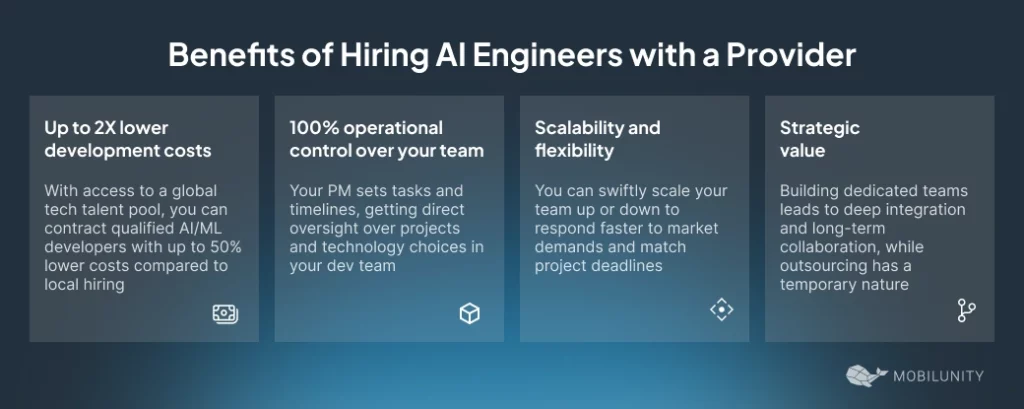AI Engineer Salary 2025: How Much Does It Cost To Hire An AI Talent?
- What Does An AI Engineer Do?
- AI Engineer Salary Overview: How Much Do AI Engineers Make?
- Additional Compensation And Benefits For Artificial Intelligence Engineers
- Factors Influencing AI Developers’ Salaries
- Regional Trends For Artificial Intelligence Engineer Salaries
- AI Talent Retention Ideas
- When To Increase The Salary Of An AI Engineer
- Future Job Outlook For AI Engineers
- Summing Up
Companies across all industries integrate AI into their operations to stay competitive and grow revenues. The demand for AI engineers is skyrocketing along with their remunerations. The US Bureau of Labor Statistics projects a 36% growth in employment of data scientists during 2023-2033, while Statista predicts that by 2030, the AI market size will reach $827 billion compared to $136 billion in 2023. Such a growth will create a high-demand environment for AI developers.
Let’s learn more about the salary of an AI engineer, including the factors impacting its level, global trends, reasons for its raising, and ways to optimize payroll costs. But first, let’s briefly review their tasks.
What Does An AI Engineer Do?
Business owners hire AI developers to build and integrate AI models and products. These experts work on complex AI systems, including NLP (Natural Language Processing), robotics, computer vision, and deep learning. They create AI-driven solutions like speech recognition, autonomous agents, recommendation engines, etc.
The core responsibilities of an AI engineer can overlap with the tasks of other AI specialists (ML engineers, data scientists) and include:
- Data collection and preprocessing
- Building and training ML models
- Refining and evaluating models’ accuracy
- Model deployment, monitoring, and maintenance.
AI Engineer Salary Overview: How Much Do AI Engineers Make?
The average salary for AI engineers grows proportionally to the living cost. Let’s explore current compensations in several popular locations, according to Glassdoor.
Below is the breakdown of the remunerations by experience. We state average timeframes for the roles, but developers can gain expertise and move to the next level faster.
Technical seniority, though, doesn’t always assume the same level of leadership skills.
Note: All salaries and prices mentioned within the article are approximate NET numbers based on the research done by our in-house Recruitment Team. Please use these numbers as a guide for comparison purposes only and feel free to use the contact form to inquire on the specific cost of the talent according to your vacancy requirements and chosen model of engagement. *denotes salaries for ML engineers.
|
Country |
Mean Annual Base Salary Across Developers’ Seniority Levels | ||
|
Junior (0-1 years) |
Mid-level (1-3 years) |
Senior (4-6 years) | |
|
USA |
$115,700 |
$132,000 |
$153,400 |
|
Germany |
$62,600 |
$64,800 |
$71,200 |
|
France |
$45,300 |
$48,600 |
$65,700 |
|
Romania* |
$19,500 |
$20,800 |
$33,600 |
|
Ukraine* |
$18,600 |
$32,400 |
$54,000 |
|
Mexico* |
$22,200 |
$24,600 |
$30,000 |
|
Vietnam |
$6,600 |
$7,600 |
$9,000 |
The USA offers the highest salaries for AI engineers, and the table shows that hiring Artificial Intelligence experts in Eastern Europe, Latin America, and Asia is 20-90% more cost-effective than in the USA or Western Europe.
The rates of middle developers are, on average, 15-30% higher than the remunerations of entry-level AI engineers. A similar trend is true for mid-level and senior AI engineer salaries.
Additional Compensation And Benefits For Artificial Intelligence Engineers
To set a competitive yet sustainable remuneration landscape for AI engineers, business owners can introduce the following incentives:
- Performance-based bonuses. These payments consider the developer’s, team’s, or company’s performance. AI engineers typically get 10%-20% of the annual salary.
- Equity and stock. Another way to pay for an AI engineer’s input is to offer your stocks and let your developers leverage the company’s growth.
- Flexible work locations. Offer remote work for AI engineers in your team, as developers highly value the work-from-anywhere approach.
- Professional development. From conferences and training to internal learning programs — you can offer professional growth to any AI engineer role.
- Health and wellness benefits. Incorporate comprehensive health insurance, mental health support therapy, reimbursements for gym membership, etc.
Factors Influencing AI Developers’ Salaries
The Artificial Intelligence engineer salary depends on several parameters:
1. Seniority of Your Engineer
Understanding the skill set of the AI developer you want to hire is vital for finding the best match for your role.
Here are the key AI skills engineers possess across the three basic seniority levels while making a career in AI.
| Experience Level | Skills | Focus and Independence |
| Junior developers | Basic understanding of ML and deep learning fundamentals (regression, neural networks, clustering) Knowing 1-2 programming languages (typically Python) and 2-3 ML libraries (PyTorch, Tensorflow, Scikit-learn, etc.) Handling simpler data cleaning, preprocessing, and exploratory data analysis | Task-oriented Require structured tasks and regular guidance to build foundational skills in coding, problem-solving, and context understanding. Need close mentorship for code reviews, technical training, and developing project awareness, helping them grow into independent contributors |
| Mid-level engineers | Good understanding of supervised and unsupervised learning, experience in developing and implementing ML models Proficiency in selecting the model, its optimization, and feature engineering Ability to integrate models with apps and familiarity with basic deployment techniques | Project-oriented Capable of independently managing defined projects, including model integration and deployment. Require occasional guidance on complex architectural decisions or novel challenges |
| Senior developers | Profound knowledge of ML and deep learning models, mastery in advanced technologies like NLP, GenAI, reinforcement learning, etc.) Designing efficient architectures, optimizing, and deploying models | Strategy-oriented Lead complex projects from planning to deployment with high autonomy, overseeing architecture, optimization, and strategic decision-making. Mentor junior and mid-level engineers, guiding teams in advanced problem-solving and innovation |
While tech expertise is vital, soft skills impact the developer’s ability to communicate ideas and collaborate effectively.
Here are the key interpersonal competencies to look for:
- Strong critical thinking and problem-solving
- Ability to explain technical concepts to non-tech colleagues and stakeholders
- Collaboration and teamwork
- Commitment to continuous learning
- Responsibility and time management
- Innovation and creativity.
2. AI Domain
The most popular and, thus, most high-payable specializations in AI are:
- Natural Language Processing (NLP). Generative AI and Large Language Models (LLM) are used for text and speech processing apps, like chatbots, language translation, tools based on sentiment analysis, etc.
- Machine Learning. We find ML in models in recommendation systems, predictive analytics, fraud detection tools, and other data-intensive apps.
- Computer vision. Facial recognition, medical imaging, autonomous vehicles, and all the software that interprets and processes visuals uses this technology.
- Reinforcement learning. This industry focuses on creating autonomous systems like supply chains, Robotic Process Automation (RPA), game development, etc.
3. Location
The country where your software engineer will be based impacts their payroll levels due to different living costs, local AI industry standards, and demand for skilled AI engineers.
Below is the classification of regions — from those with the highest to the lowest payrolls:
Tech-Centric Areas
In Silicon Valley, Seattle, New York City, and similar regions, Artificial Intelligence engineers get the highest salary in the United States and earn 20-40% more than elsewhere due to the high concentration of tech companies and high cost of living.
Emerging Tech Markets
Cities like Denver, Toronto, and Austin offer comparatively lower salaries for AI engineers than top tech hubs. Due to slightly lower living costs in Berlin and Amsterdam, AI engineers’ compensations are expected to be high but not top-of-market.
Low-Cost Regions
The average salary for an Artificial Intelligence expert in Eastern Europe, Southeast Asia, India, and other outsourcing hubs is significantly lower than in the high-cost and mid-tier destinations.
4. Collaboration model
Once you need to access remote AI engineers with specialized skills and build a dedicated team, you have three basic options:
| Cooperation Format | Who Works On the Project | Ideal for | Pros | Cons |
| Freelancers | Independent AI developers | Short-term projects or one-off tasks | Flexibility Cost-effectiveness Niche skills | Limited availability Less control Data security risks |
| Outsourcing | An external software development company | Larger projects that can be delegated entirely (turnkey solutions) | Cost-efficiency Scalability Focus on business needs | Potential communication barriers Data security concerns Limited control |
| Dedicated dev teams | Developers technically contracted by a vendor and actually working as your employees | Long-term projects when you need to extend your team or hire niche experts and scale quickly | Full functional control Scalability Strategic partnership | Own project manager More expensive than freelancers |
Many businesses choose to partner with a hiring provider because of the advantages this cooperation brings.

Regional Trends For Artificial Intelligence Engineer Salaries
The growing demand for AI specialists, talent shortages, and rapid advancements in AI technologies provoke an increase in Artificial Intelligence engineer salaries.
Below are the trends across several regions (according to Glassdoor, October 2024).
North America
The AI engineer salary in the United States remains the highest in the world, especially in top tech hubs like San Francisco, Seattle, etc. There, the annual salary across all occupations ranges between $80,000 and $200,000, while remunerations in tech giants can reach $300,000.
Europe
Germany and the UK offer competitive salaries in the field of Artificial Intelligence. In London, salaries for AI engineers vary from $70,000 to $95,000, while in Berlin, the average salary of an Artificial Intelligence engineer ranges between $90,000 and $120,000.
Asia
Japan and South Korea offer ample opportunities for AI engineers. A junior AI developer in Tokyo gets around $20,000, and a senior engineer earns $50,000 on average. However, India, Philippines, and Vietnam pay lower averages — from $15,000 to $27,000.
Middle East
The demand for skilled AI professionals in the UAE, Saudi Arabia, and Israel is evolving as companies increasingly rely on AI technologies in this region and prioritize the AI landscape. In Israel, the salary ranges from $55,000 to $125,000.
Latin America
Colombia, Peru, and Chile promise higher salaries for AI engineers than Mexico, Argentina, and Brazil. In Mexico, one can get $8,000-$16,000 working as an AI engineer; in Colombia, the compensation ranges from $12,000 to $27,000.
AI Talent Retention Ideas
Investing in Artificial Intelligence teams’ development is a part of any company’s AI strategy as it drives business expansion and competitiveness.
Though you’ll have to pay higher salaries, growing your own specialists is often more cost-effective than hiring externally.
Here’s how you can expand the competency of your Artificial Intelligence developers:
Deepen Technical Expertise
Domain-specific skills and an understanding of your business needs will let your dev team create unique AI systems that are difficult to replicate.
Gain Leadership/Mentorship Experience
Cultivating your tech talent pipeline creates a culture of leadership and mentorship, multiplying expertise in your company. It also enhances team productivity and fosters innovation.
Engage in Product Management
AI developers who understand business goals will build feasible, scalable, and useful features. They can adapt models to product goals faster and reduce time-to-market.
Developing Cross-Disciplinary Skills
When your developers think beyond code, they add insights from other areas, boost problem-solving, and better align their work with organizational goals.
When To Increase The Salary Of An AI Engineer
Here are the examples of reasons for raising the salary for an AI engineer:
|
Reasons |
Description |
|
Significant skill growth |
Recognize your developers’ growth in high-demand AI fields like computer vision, NLP, or advanced machine learning. Praise gaining skills in cloud and deployment, getting certifications, or trying leadership roles. |
|
Successful projects outcomes | Raise your AI engineer pay when they contribute to substantial company gains from successful project completions. Such an appraisal will also reinforce their future engagement in your projects. |
|
Expanded responsibilities |
A salary increase can reflect taking on cross-functional, managerial, or mentoring responsibilities. Payment for added roles will motivate your developers to keep mastering new skills. |
|
Retention for rare-skilled devs |
Paying more to top talents that are in high demand will boost their satisfaction and loyalty. This helps you mitigate the retention risk and avoid losing a high-performing engineer who brings significant business value. |
|
Keeping your salaries competitive |
Monitor the average annual salary benchmarks for AI and Machine Learning professionals in your field of AI and location. Make adjustments to prevent attrition and ensure your engineer compensation remains competitive. |
Future Job Outlook For AI Engineers
The job market for AI engineers will continue to grow in the next decade due to the following factors:
- Fast AI adoption. Companies across multiple industries (tech, finance, healthcare, automotive) integrate AI solutions into their products.
- Growing investments. Governments and businesses grow funding into AI research, driving careers in AI engineering.
- High Demand for AI Professionals. The need for Artificial Intelligence experts exceeds the supply, especially in areas such as generative AI, deep learning, and computer vision.
- Competitive salaries. A career as an AI engineer in top fields like machine learning, robotics, and data science looks attractive due to high salaries and stability.
The demand for competent developers will increase along with the number of applications of AI, prompting the growth in the average AI engineer salary.
Summing Up
The compensation for an AI engineer job in 2024 varies significantly based on their experience, location, industry, and hiring models. With the growing impact of AI, the need for skilled professionals will increase, along with their salaries.
However, a reliable dedicated dev team vendor can help you hire Artificial Intelligence developers cost-effectively and without compromising product quality.













